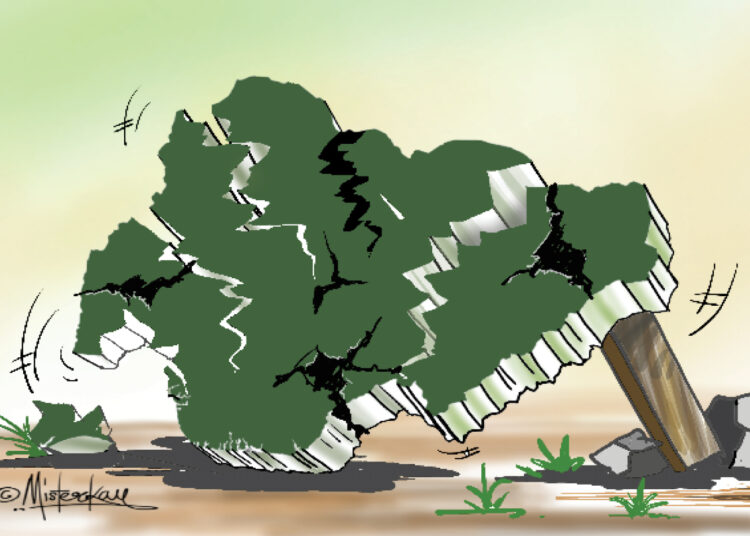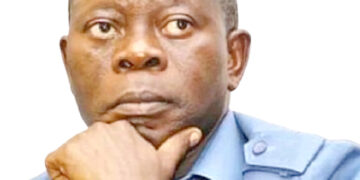Chinua Achebe’s Things Fall Apart (1958) is not just a seminal work of African literature by the literary icon—it also serves as a profound metaphor for the current political turmoil in Nigeria. Achebe’s novel, which chronicles the collapse of Igbo society—a major ethnic group in southeastern Nigeria, known for their distinct culture, language and history under the pressure of colonialism and internal conflict.
The novel revolves around Igbo history and heritage during the British colonial era which mirrors the current state of Nigeria—particularly in governance, identity, and national cohesion. It resonates with the confluence of political and economic challenges that are impacting our stability and development.
In Things Fall Apart, the arrival of colonial forces disrupts the traditional Igbo socio-political structure, leaving the community fractured. Similarly, Nigeria’s political landscape is marked by the erosion of democratic norms, institutional failures, and the breakdown of trust between the government and its citizens. The recent state of emergency in Rivers State, which suspended elected officials, mirrors the imposition of external authority in the novel, where traditional leadership is undermined by colonial powers. This move by the federal government has raised concerns about the fragility of Nigeria’s democratic institutions and the arbitrary use of power.
Achebe further portrays the Igbo people grappling with a loss of cultural identity in the face of external domination. Today, Nigeria’s political system reflects similar tensions—ethnic divisions, regional rivalries, and debates over resource control. The suspension of Senator Natasha Akpoti-Uduaghan after her sexual harassment allegations against Senate President Godswill Akpabio reveals how institutional power is often wielded to silence dissent. Her suspension echoes the fate of Okonkwo, who showed strength of character and a commitment to his conviction regardless of the consequences.
A Contorted Political Structure
On March 18, 2025, President Bola Tinubu declared a state of emergency in Rivers State, an oil-rich region in the Niger Delta and appointed Retired Vice Admiral Ibok-Ete Ekwe Ibas as the sole administrator. This unprecedented move led to the suspension of Governor Siminalayi Fubara, his deputy, and all state lawmakers for six months. The federal government cited escalating political instability and recent incidents of pipeline vandalism, including a fire on the Trans Niger Pipeline, as reasons for the intervention.
The Nigerian Bar Association has criticized the suspension of elected officials as potentially unconstitutional, emphasizing that emergencies should not dissolve elected governments. Political pundits including Nobel Laureate Prof Wole Soyinka argue that this move by the President is a travesty, excessive and an assault on democracy. The media is rife with insinuations that there are forces in the corridors of power at the federal level who are orchestrating the challenges in Rivers state. Curiously, while the impasse lasted, state allocations were withheld only to be released as soon as the sole administrator was appointed.
Last week, news filtered in about a recall process being procured for Senator Akpoti-Uduaghan. Under the invitation to receive empowerment materials, constituents from the Kogi Central Senatorial District were asked to come along with their voter’s card only to find out that it was a recall process. Reports say, many declined when the true intentions were known.
However, on March 24, in a turn of events only possible in Nigerian politics, the media reported that over 250,000 constituents had submitted a recall petition to the Independent National Electoral Commission (INEC) in Abuja. Many question these figures considering the number of registered versus actual voters in the 2023 elections. Is the Nigerian electorate truly that informed to independently coalesce and institute a recall process against a serving senator?
These political absurdities call for citizens to challenge those in leadership to course correct, for men and women of good faith to stand for the truth and against all forms of challenges that undermine Nigeria’s democratic freedom, and that justice prevails.
A Collapsing Economy
Added to the political quagmire is the fact that Nigeria’s economy is facing significant headwinds, characterized by currency devaluation, high inflation, and rising food insecurity. The naira’s depreciation has adversely affected businesses; for instance, MTN Group reported a 69% decline in full-year earnings, attributing it partly to the weaker naira. Inflation has surged, driven by rising food prices, exacerbating the cost-of-living crisis.
The United Nations has appealed for $910 million to address the humanitarian situation in northeastern Nigeria, where millions are in need due to conflict and economic hardship. Projections indicate that over 30 million Nigerians could face food insecurity this year. But leadership is more worried about political manoeuvres.
In response to these challenges, the Nigerian government has implemented reforms, such as eliminating petroleum subsidies and unifying the exchange rate to reflect market conditions. While these measures were presented to stabilize the economy and attract investment, they have also led to short-term economic difficulties for the population which the current administration did not provide mitigation strategies for.
Collectively, these political and economic issues underscore the complex landscape Nigeria currently navigates, reflecting the urgent need for comprehensive strategies to promote stability, economic growth, and good governance. Echoing Achebe’s words of wisdom again, “the trouble with Nigeria is simply and squarely a failure of leadership.”
While there are mixed feelings about the current state of the nation and the direction it is headed, majority of Nigerians agree that all is not well, that things are falling apart, and the centre can no longer hold. The bigger issue is how does Nigeria navigate this political, social and economic quagmire?
When the Centre Cannot Hold
Achebe’s novel juxtaposes traditional values with the incursion of Western modernity, ultimately showing how rigid adherence to old ways can lead to collapse. Nigeria’s political quagmire similarly reflects a clash between entrenched systems of patronage and the need for progressive reform. Economic policies—such as the removal of fuel subsidies and the unification of exchange rates—have sparked public discontent, much like the friction in Things Fall Apart when societal norms are challenged by new ideologies.
Okonkwo’s tragic flaw—his inflexible nature and obsession with power—leads to his personal ruin and the unravelling of his community. In Nigeria, many political figures similarly prioritize personal ambition over collective welfare, contributing to political instability and economic hardship. The devaluation of the naira and rising inflation reflect the consequences of leadership decisions that fail to address the realities of everyday citizens.
In Achebe’s narrative, those who remain silent or passive in the face of injustice ultimately enable the disintegration of society. In Nigeria, the suppression of dissent—whether through media censorship or political manoeuvring—deepens the crisis. Civil society’s role in advocating for accountability is as vital now as the voices of those in Umuofia who sought to preserve their cultural (national) integrity.
Chinua Achebe once remarked that “the trouble with Nigeria is simply and squarely a failure of leadership.” This sentiment is reflected in both his novel and the nation’s current political reality. The lessons of Things Fall Apart—the perils of inflexibility, the need for inclusive governance, and the consequences of unchecked power—are starkly relevant as Nigeria navigates its present quagmire.
Without urgent reforms and a commitment to justice, the country risks following the tragic path of Achebe’s fictional Umuofia, where the centre could no longer hold, and mere anarchy was loosed upon the world.





